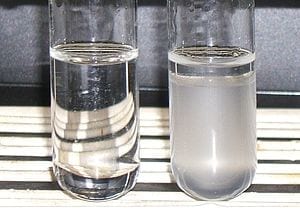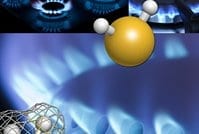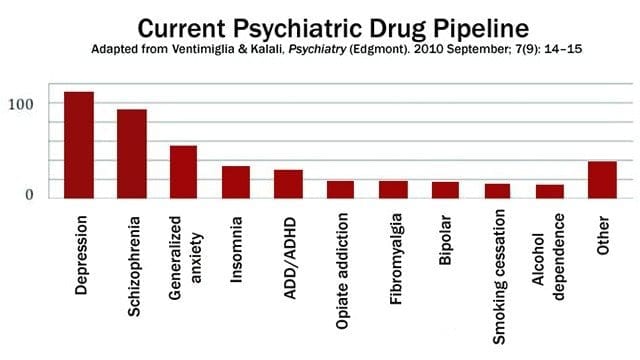
“Ethanol actually is a poor alternative fuel,” Wass said. “Butanol is much better.
Scientists today reported a discovery that could speed an emerging effort to replace ethanol in gasoline with a substantially better fuel additive called butanol, which some experts regard as “the gasoline of the future.” Their report on this discovery, which holds potential to reduce the costs of converting ethanol factories to production of butanol, came at the 245th National Meeting & Exposition of the American Chemical Society, the world’s largest scientific society.
Duncan Wass explained that ethanol has become a leading biofuel — millions of gallons added to gasoline around the country each year — despite several disadvantages. Ethanol, for instance, has a lower energy content per gallon than gasoline, which can reduce fuel mileage. Ethanol also has a corrosive effect on car engines and can’t easily be used in amounts higher than 10-15 percent.
“Ethanol actually is a poor alternative fuel,” Wass said. “Butanol is much better. It contains about 30 percent more energy per gallon than ethanol, is easier to handle and more of it can be blended into each gallon of gasoline. In fact, you could fuel a car on pure butanol and it would run absolutely fine. That’s the basis for butanol’s emerging reputation as ‘the gasoline of the future.’”
Efforts already have begun to convert some ethanol factories in the Corn Belt to production of butanol, Wass explained. Those factories currently process corn into alcohol with the same fermentation technology used to make beer and beverage alcohol. Converting those factories to ferment corn into butanol would require costly modifications, estimated at $10 million-$15 million for a typical plant.
Wass and his group at the University of Bristol in the U.K. are reporting the discovery of a new family of catalysts that could enable those factories to continue producing ethanol, with the ethanol then converted into butanol. With the catalysts, ethanol factories would require less retrofitting to produce butanol. Catalysts speed up chemical reactions by lowering the amount of energy needed need to jumpstart reactions. They enable production of hundreds of everyday products, and many of the proteins that sustain life are catalysts called enzymes.
Their report was part of a symposium on renewable fuels and catalysts. Abstracts of other presentations appear below.
“These new catalysts are much better than any previously in existence,” Wass said. “There’s a long way to go before they are commercialized, but we are reporting a fundamental advance in that direction. Quite simply, they are the world’s best catalysts for making the gasoline of the future.”
The Latest Bing News on:
Butanol
- Chaim Wiezmann: ‘I am now convinced that without him there would be no state of Israel’on May 3, 2024 at 6:51 am
The brilliant chemist used acetone to advance Zionism in the same way Herzl used journalism, says the co-author of a magisterial new biography of the leader ...
- Bharat Petroleum Corporation Limited keeps I-Butanol prices steady in the domestic market of Indiaon May 2, 2024 at 11:58 pm
We use cookies to authenticate, authorize, verify, analyze and secure the application. The application will not work with cookies disabled. if the cookies are disabled on your browser, please enable ...
- Complaints of odors from Hartland Landfill linger as town works toward closureon April 29, 2024 at 3:35 pm
Some residents say the town and state do not do enough to respond to their concerns. Officials say they do what they can, and are following the wishes of voters.
- Global Formaldehyde-Free Resin Market to Maintain Steady 6.9% CAGR Amid Regulatory Hurdles and Raw Material Volatilityon April 29, 2024 at 10:53 am
The global formaldehyde-free resin industry size was worth US$ 8.35 Billion in the year 2022 and is expected to reach US$ 16.26 Billion by the year 2032 at a CAGR of 6.9% between 2022 and 2032. The ...
- Complaints of odors from Hartland Landfill linger as town works toward closureon April 28, 2024 at 5:00 pm
That’s how bad it’s gotten.” He said a trained landfill employee measures the odor using a technique known as n-butanol, which identifies intensity, duration and frequency of odors.
- Temperature Can Totally Make Or Break The Beer Brewing Processon April 8, 2024 at 9:32 am
It can also stop producing ethanol — the alcohol type that's typical in beer — and start producing fusel alcohols like propanol and butanol; these types of alcohol are what give your booze a ...
- How to prevent a hangover, and 3 ways to treat oneon May 5, 2023 at 4:43 am
n-butanol, isopentanol and isoamyl alcohols. While these congeners, as they are called, are added in small, nontoxic amounts, some people are overly sensitive to their effects. Overall ...
- Fuel Additives Informationon February 11, 2018 at 6:39 am
Oxygenates are divided into alcohols and ethers. Methanol (MeOH), ethanol (EtOH), isopropyl alcohol (IPA), n-butanol (BuOH), and gasoline-grade t-butanol (GTBA) are alcohol oxygenates. Ether ...
- Qingliu Wuon September 26, 2017 at 10:29 am
Dr. Qingliu Wu joined Western Michigan University in August 2017 as an Assistant Professor in the Department of Chemical and Paper Engineering. Prior to joining Western Michigan University, Dr. Wu was ...
- More organic chemistry - AQAon June 3, 2015 at 2:12 pm
However, the solubility decreases as the length of the alcohol molecule gets longer, so butanol is less soluble than propanol. It may not mix easily, and two distinct layers might be left in the ...
The Latest Google Headlines on:
Butanol
[google_news title=”” keyword=”butanol” num_posts=”10″ blurb_length=”0″ show_thumb=”left”] [/vc_column_text]The Latest Bing News on:
Gasoline alternative
- US’s largest public utility ignores warnings in moving forward with new natural gas planton May 7, 2024 at 9:13 pm
The nation’s largest public utility is moving ahead with a plan for a new natural gas plant in Tennessee despite warnings that its environmental review of the project doesn’t comply with federal law.
- Biden aviation fuel plan sinks hopes for ethanolon May 7, 2024 at 10:15 am
The Treasury Department's guidance for an aviation fuel tax credit was a mixed bag for biofuels, with corn-based ethanol falling short of climate-smart ...
- Ethanol Market To Reach USD 142.02 Billion By 2031 Driven By Surging Demand For Sustainable Fuel Alternativeson May 5, 2024 at 6:11 am
( MENAFN - Evertise Digital) - The SNS Insider report sheds light on the promising future of the Ethanol Market . The report estimates that the market size, valued at USD 91.15 Billion in 2023, ...
- Alt-fuel vehicles don’t necessarily have to break the bankon May 1, 2024 at 1:57 pm
A common hesitancy consumers might have about buying alternative-fuel vehicles (even used ones) is that the cost is too high. And that assumption isn’t entirely wrong — it might be fair on some models ...
- Porsche will run an entire race series using only synthetic fuelson May 1, 2024 at 10:15 am
Up to 32 cars will compete in the 2024 season of Porsche's Supercup series, and they'll all burn a synthetic fuel manufactured by the brand.
- Love’s Executive Testifies on Alternative Fuels Before House Subcommitteeon April 30, 2024 at 1:13 pm
The right policy framework and incentive structure will advance the market for alternative fuels, including electricity, while lowering carbon emissions for transportation energy, a representative of ...
- What Is Sustainable Aviation Fuel, and Will It Really Make Flying Greener?on April 29, 2024 at 3:27 pm
The first commercial transatlantic flight powered by sustainable aviation fuel, or SAF, took off in November. Going forward, what is the alternative fuel’s potential—and could it make flying more ...
- Legislators too ‘trigger-happy' on banning alternative fuels, Volvo Trucks sayson April 29, 2024 at 11:43 am
As legislators and regulators across the globe pursue fully emissions-free transportation, Volvo Truck's complaint raises questions about whether alternative fuels have a role to play in a green ...
- The Power of Us: As EV demand slows, a new alternative fuel garners attentionon April 29, 2024 at 6:37 am
Golub considers himself an early EV adopter, someone who's willing to deal with some of the frustrations that come with new technology. But more mainstream consumers generally have a lower tolerance ...
- In the rush to decarbonize, the shipping industry is exploring alternative fuelson April 27, 2024 at 8:59 am
HFO and other fossil fuels, he says, are already beginning to give way to cleaner alternatives. In mid-2023, for example, a new container ship, the US $160-million Laura Maersk, began operating in the ...
The Latest Google Headlines on:
Gasoline alternative
[google_news title=”” keyword=”gasoline alternative” num_posts=”10″ blurb_length=”0″ show_thumb=”left”]









